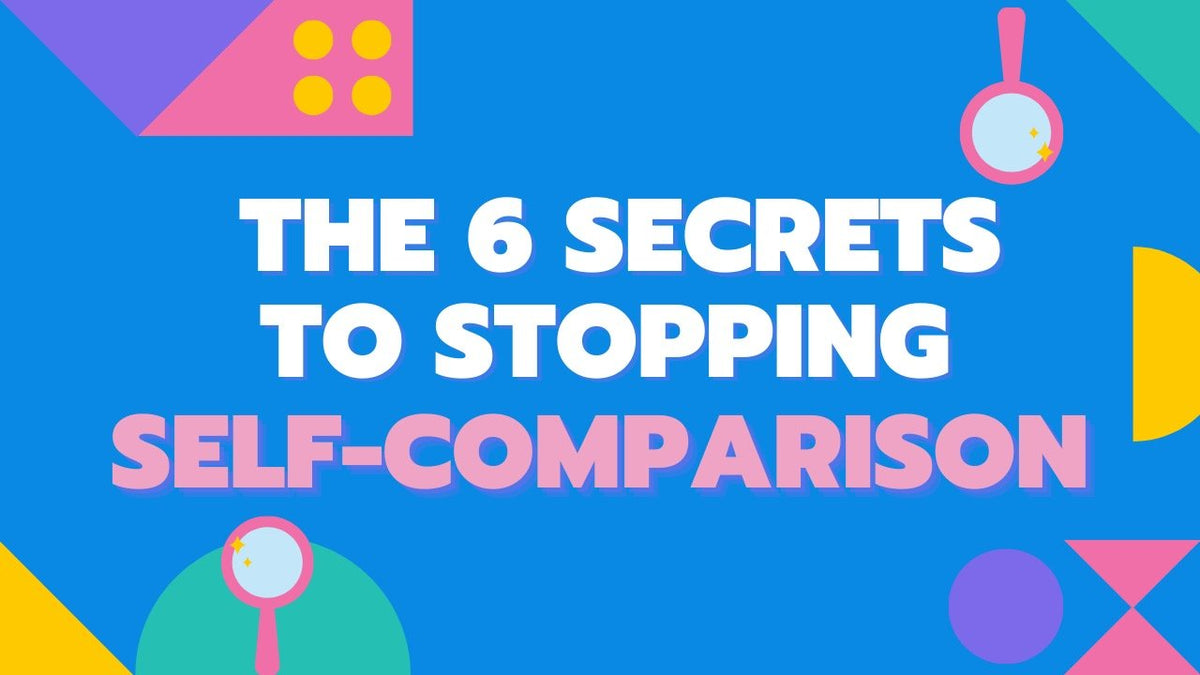The 6 Secrets to Stopping Self Comparison

It’s easy to give objective advice, and tell someone “not to compare themselves to others because everyone is on their own journey.” However, as we all know, it’s very difficult to practically apply this mindset in real life. While it’s nice to encourage positive thinking, is it enough to empower you with the tools to stop comparing?
As someone who constantly self-compares, I have always found myself with more questions than answers when advised to “never compare.” I know this is what I should do, but I don’t know how, so I wish for an instruction manual, a roadmap to rid me of my painful compulsion. Unfortunately, I have yet to find that roadmap. In reality, there is no single path forward. We are all individuals, so there can’t truly be a one size fits all approach, but there are some common approaches that can be customized to suit each individual. Personally, I have started to take a more active approach towards self-awareness, as I identify my triggers, and positive coping mechanisms.
Comparison in and of itself isn’t always negative. To some extent, we need it in order to gauge boundaries for behavior and societal norms, such as when to wear a mask or how to greet people in different circumstances and cultures. Comparison can also be a positive when we use it in the context of inspiration, seeking out others whose work and purpose is aligned with our own. It’s when we use comparison to diminish ourselves that it becomes a problem.
What I’ve observed is that comparison normally occurs when our sense of self is compromised. When my self-worth is low, or my anxiety is high, or my faith is wavering, I’m more vulnerable to negative comparisons because I feel unworthy. I believe the true work lies in developing our self-efficacy, to prevent being debilitated by self-comparison. Let’s explore a few tools that might help.
1. Try not to compare your insides to someone else’s outsides: We’re all comparing our behind-the-scenes footage to someone else’s highlight reel. This is especially true within the social media sphere, where it’s so easy to forget that what we’re looking at is a curated moment in time, and not a true representation of another’s reality. We’re only seeing what the creator wants us to see. We have no idea what they’re going through behind the scenes. If we practice tuning into our awareness, we become less susceptible to comparison.
2. Look inward, not outward: Get to know the things that may trigger the impulse to compare. For example, you might notice that on a day where you feel anxious or are stressed about something professional or personal, you’re more vulnerable in general, leaving room for comparison to creep in more easily. That simple awareness in itself helps us understand that we’re just having a bad day vs. genuinely believing others are better off.
3. Turn that FOMO into JOMO: Comparison is essentially FOMO, which is precisely why the advice that “everyone is on their own journey” sometimes fails. The reason we’re comparing in the first place is that we want to be on someone else’s journey instead of our own. Why? Because we imagine they have it better than we do. The truth is there are infinite ways to make ourselves feel less than. The more we feel aligned with our own values, the less likely we are to fall victim to comparison.
4. What we appreciate, appreciates: This is a coaching phrase, which I absolutely love because it feels so logical. What we appreciate is where we’re putting our focus, attention and energy. Everything we do requires energy, so it’s only natural that where we’re putting that energy becomes our direction in life. To use a tangible example, a professional athlete will put in hours per day training in their sport the same way an artist may spend hours honing their art. In both cases, muscles, creativity, and skill will strengthen, grow and flourish because that’s where the energy is being spent. We may not know it, but when we spend time comparing, that too becomes a habit, and before we know it, it becomes our direction. This leaves less energy for positive things that feed us. The more time we spend doing things we love, the less space there is for comparison to creep in.
5. Express yourself: I used to feel as though I had to hide my negative feelings. I felt shame for feeling less than, and even more shame about admitting to my insecurity. I’ve only recently discovered that talking about it not only removes the taboo, but also disproves and normalizes the thoughts. I feel so much relief being able to express myself authentically. Finding safe places and people where we can really connect is paramount to removing taboo and reducing the tendency for comparison.
6. Trust your gut: We’re creatures and all creatures have instincts. I love to observe animals because they’re so in tune with their instincts. For example, my beloved dog has various food intolerances. I noticed she wouldn’t even touch some of the things she knows are bad for her despite them being listed among the healthiest for doggie digestion. When food intolerance testing confirmed her instincts, I was amazed at her insight. As humans, we also have instincts, which we can practice becoming attuned to using very simple tools. The first step is believing our instincts are real and that we can trust them. The second is becoming aware of how they communicate with us. Our instincts are there for a reason. The more we practice listening to them, the easier they are to understand, and the more aligned we become with who we are and what we truly care about.
